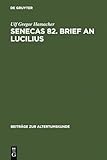Senecas 82. Brief an Lucilius : Dialektikkritik illustriert am Beispiel der Bekämpfung des metus mortis. Ein Kommentar / Ulf Gregor Hamacher.
Material type: TextSeries: Beiträge zur Altertumskunde ; 230Publisher: Leipzig : B. G. Teubner, [2012]Copyright date: ©2006Edition: 1. AuflageDescription: 1 online resource (473 p.)Content type:
TextSeries: Beiträge zur Altertumskunde ; 230Publisher: Leipzig : B. G. Teubner, [2012]Copyright date: ©2006Edition: 1. AuflageDescription: 1 online resource (473 p.)Content type: - 9783598778421
- 9783110910759
- PA6661.E8
- online - DeGruyter
- Issued also in print.
| Item type | Current library | Call number | URL | Status | Notes | Barcode | |
|---|---|---|---|---|---|---|---|
 eBook
eBook
|
Biblioteca "Angelicum" Pont. Univ. S.Tommaso d'Aquino Nuvola online | online - DeGruyter (Browse shelf(Opens below)) | Online access | Not for loan (Accesso limitato) | Accesso per gli utenti autorizzati / Access for authorized users | (dgr)9783110910759 |
Browsing Biblioteca "Angelicum" Pont. Univ. S.Tommaso d'Aquino shelves, Shelving location: Nuvola online Close shelf browser (Hides shelf browser)
i-vi -- Vorwort -- Inhalt -- Vorbemerkung -- Einführung -- Text, Übersetzung und Erläuterungen -- I. Einleitung (§§ 1–8) -- II. Hauptteil: Nachweis psychagogischer Defizienz der Dialektik am Beispiel des metus mortis (§§ 9–22) -- A. Doxographie: Reductio ad absurdum zweier konkreter Syllogismen (§§ 9-19) -- Β. ΡSYCHAGOGIE (§§ 20–22) -- III. Schluss: Problemgeneralisierung (§§ 23–24) -- Appendix -- Verzeichnis abgekürzt zitierter Literatur -- 474-476
restricted access online access with authorization star
http://purl.org/coar/access_right/c_16ec
Im 82. Brief an Lucilius führt Seneca den Versuch, mittels Dialektik in Form eines Syllogismus von der Todesfurcht zu befreien, durch seine eigene unnachahmliche Art der Psychagogie ad absurdum. Der bisher im Einzelnen noch nicht hinreichend erklärte Text wird durch eine ausführliche Einleitung und einen Kommentar (mit durchgängiger interpretierender Übersetzung) erschlossen. Die Einleitung ordnet den Brief in die dialektische Tradition der Stoiker ein, beleuchtet römische Einschätzungen der Dialektik und versucht auf dieser Basis Senecas durchaus differenzierte Position herauszuarbeiten. Den Hauptteil bildet ein detaillierter Kommentar mit textkritischen, sprachlichen und sachlichen Erläuterungen.
In his 82nd Epistle to Lucilius, Seneca uses his inimitable method of psychagogy to reduce ad absurdum the attempt to banish the fear of death through dialectical reasoning in syllogistic form. This text has never before received an adequate and thorough explanation. Here it is examined in a detailed introduction and a commentary (with a continuous interpretative translation). The introduction locates the Epistle in the dialectical tradition of the Stoics, illustrates Roman attitudes towards dialectic, and on this basis attempts to reveal the sophistication of Seneca's philosophical position. The main section comprises a detailed commentary on matters of textual criticism, language, style and realia.
Issued also in print.
Mode of access: Internet via World Wide Web.
In German.
Description based on online resource; title from PDF title page (publisher's Web site, viewed 28. Feb 2023)









